Fatherland Blu-ray Movie
HomeFatherland Blu-ray Movie 
Indicator Series | Limited EditionPowerhouse Films | 1986 | 111 min | Rated BBFC: 15 | Apr 26, 2021
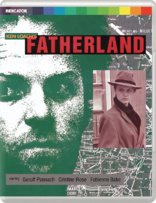
Movie rating
6 | / 10 |
Blu-ray rating
| Users | 0.0 | |
| Reviewer | 2.5 | |
| Overall | 2.5 |
Overview
Fatherland (1986)
A pop singer (Gerulf Pannach) from East Germany goes west to find his exiled father and expand his career.
Starring: Gerulf Pannach, Fabienne Babe, Sigfrit Steiner, Cristine Rose, Robert DietlDirector: Ken Loach
| Drama | Uncertain |
| Music | Uncertain |
Specifications
Video
Video codec: MPEG-4 AVC
Video resolution: 1080p
Aspect ratio: 1.66:1
Original aspect ratio: 1.66:1
Audio
English: LPCM Mono
Subtitles
English, English SDH
Discs
Blu-ray Disc
Single disc (1 BD)
Playback
Region B (A untested)
Review
Rating summary
| Movie | 2.0 | |
| Video | 3.5 | |
| Audio | 5.0 | |
| Extras | 2.5 | |
| Overall | 2.5 |
Fatherland Blu-ray Movie Review
Reviewed by Dr. Svet Atanasov May 2, 2021Ken Loach's "Fatherland" a.k.a. "Singing the Blues in Red" (1986) arrives on Blu-ray courtesy of Indicator/Powerhouse Films. The supplemental features on the disc include new program with editor Jonathan Morris; vintage promotional materials; bonus films; and more. In English, with optional English SDH subtitles for the main feature.
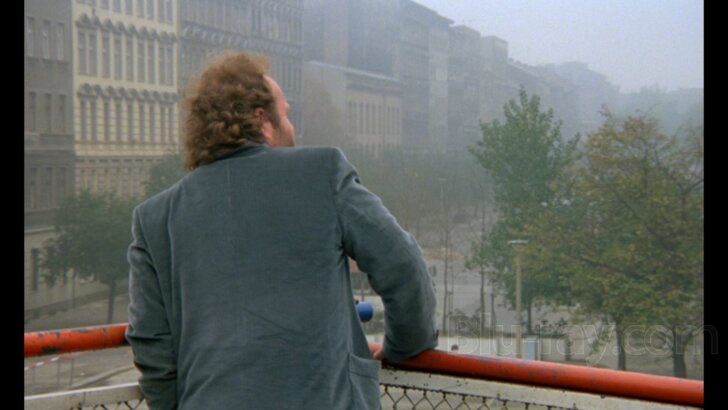
Ken Loach’s Fatherland is so bad at manipulating that it almost feels like a secret project conceived by Konrad Wolf and his buddies at DEFA in the years after they realized that the GDR’s collapse was inevitable. Almost. Some of its insinuations are actually so ridiculous that I don’t think even the Party’s top propagandists would have been comfortable using them. The West a bigger oppressor than the Soviet Bloc? Stalinism unrelated to Socialism? Democracy incompatible with freedom? As a devout socialist who had never lived on the other side of the Iron Curtain Loach probably believed some of this nonsense back in the ‘80s when he made the film, but the exaggerations and lies are still quite astonishing because even then there was already plenty of factual information to instantly dismiss them. Consider this: the entire system of governing in the post-Stalin years all the way to the perestroika was based on the idea that the Party’s leadership is not to be disputed. Why? Because it was widely believed that under Stalin’s leadership the Party perfected the ultimate form of socialism, which as Vladimir Lenin correctly predicted had quickly evolved into communism. This is the very reason why in 1954, approximately a year after Stalin’s death, Nikita Khrushchev replaced the People’s Commissariat for State Security, or NKGB, with the KGB, and promptly transformed the latter into an international juggernaut -- the KGB was tasked to protect Stalin’s legacy and the Party at home and abroad, and neutralize anyone that did not approve of the status quo. Everyone knows what happened after that. For decades, the KGB controlled half of Europe, most of Asia and Africa, and a number of ‘friendly governments’ in South America.
But somehow this is a lost point in Fatherland, which is quite bizarre, to say the least, because Loach actually recognizes that the GDR was run by Stasi, the East German equivalent of KGB, which reported directly to the Kremlin. When its main protagonist, Klaus Drittemann (real-life musician and singer Gerulf Pannach), a popular young dissident who has used his songs to criticize the authorities in the GDR, is forced to leave the country, Stasi agents immediately begin following him, hoping that a time will come when they will be able to use his inevitable dissatisfaction with capitalism to their advantage. Of course, Drittemann does not disappoint and instead of signing a lucrative contract with an American company with offices in West Berlin, he goes on offense and begins making public speeches that target the supposedly exploitative nature of the music business. So, follow the logic here: the GDR is bad because outspoken artists like Drittemann are not allowed to flourish there, but the West is even worse because capitalism is only interested in exploiting his talent. Right. How come over the years talented artists and bands always tried to move West, and specifically to America, where they were supposedly badly exploited, but we never heard of any established artists and bands going in the opposite direction where they would have been treated fairly? Could it be that the version of the West that Fatherland sells is deeply flawed?
Soon after, Drittemann begins looking for his long-lost father, who years ago also moved West. A French-Dutch journalist (Fabienne Babe) joins him and eventually they end up in England, where they discover that Drittemann’s father, now a very, very old man, has been living under an alias. On top of this, he is also hiding a dark secret.
Fatherland was supposedly inspired by true events from Pannach’s real-life story, but it is awfully difficult not to profile as a very badly conceived political film. The fact that Loach does not miss an opportunity to channel political statements is not surprising because he has been doing it since the beginning of his career, but this time there are simply too many bizarre contradictions and fabrications. The mystery from the second half does not accomplish anything positive either. In fact, it only makes the politics even easier to dismiss.
Fatherland Blu-ray Movie, Video Quality 
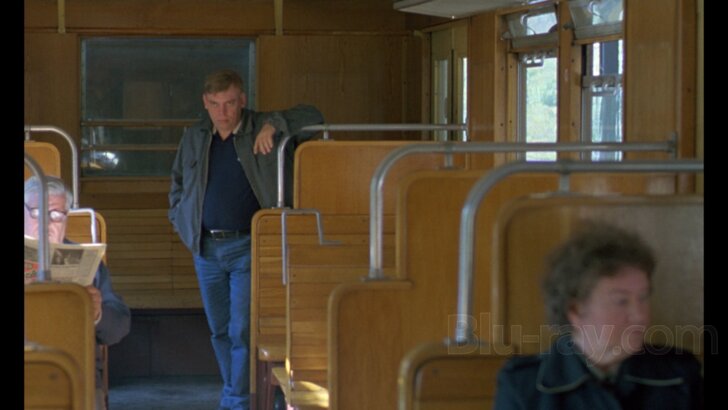
Presented in an aspect ratio of 1.66:1, encoded with MPEG-4 AVC and granted a 1080p transfer, Fatherland arrives on Blu-ray courtesy of Indicator/Powerhouse Films.
The film looks softer than it should and in many areas dated as well. The softness alone I don't think is a major issue, but there are a lot of areas where finer nuances are quite difficult to identify. This is one of the reasons why depth isn't overly convincing either. Another reason is the emergence of light to moderate black crush in darker areas; some less than impressive highlights contribute to the inconsistencies as well. Grain exposure isn't impressive, but I don't find it problematic. Again, the underwhelming dated appearance of the visuals is a byproduct of a number of different issues. Colors are stable, but saturation could be better and more accurate. It is very easy to tell that some nuances can be expanded as well. Image stability is good. A few white flecks can be spotted, but there are no distracting large debris, cuts, warped or torn frames to report. (Note: This is a Region-B "locked" Blu-ray release. Therefore, you must have a native Region-B or Region-Free player in order to access its content).
Fatherland Blu-ray Movie, Audio Quality 
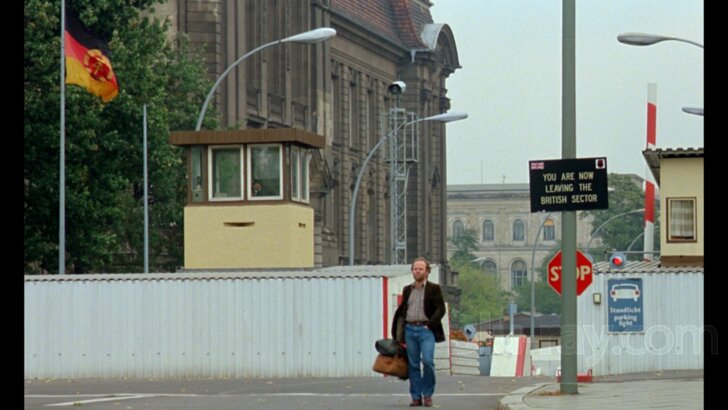
There is only one standard audio track on this Blu-ray release: German LPCM 1.0 (with small portions of English). Optional English SDH subtitles are provided for the main feature. (English subtitles appear for the German dialog).
The audio is clean and stable. Balance is good as well. I did not detect any age-related imperfections in the upper register and I had the volume on my system turned up quite a bit. The music sounded clear and sharp, but the dynamic intensity is pretty modest. This should not surprise you because this is a common quality of Ken Loach's films.
Fatherland Blu-ray Movie, Special Features and Extras 
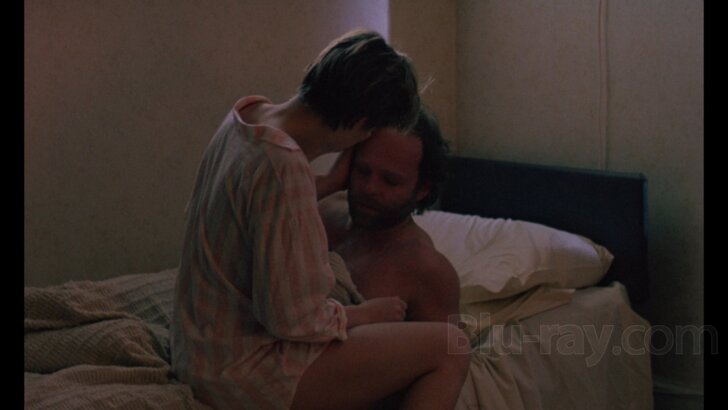
- Trailer - remastered trailer for Fatherland. Music only. (2 min).
- Image Gallery - a collection of original promotional materials for Fatherland.
- Original Shooting Script - a collection of original promotional materials for Fatherland.
- Jonathan Morris: Language Barriers - in this new program, editor Jonathan Morris recalls his work on Fatherland. In English, not subtitled. (7 min).
- Bonus Films -
1. Talk About Work (1971). Directed by Ken Loach. In English, with optional English SDH subtitles. (16 min).
2. Right to Work March (1972). Documentary film of a five-week protest march from Glasgow to London that saw the participation of a number of cultural figures, including Ken Loach and other filmmakers. In English, with optional English SDH subtitles. (43 min).
- Booklet - limited edition booklet with a new essay by Frank Collins, an archival interview with Ken Loach, an extract from Loach on Loach, an overview of contemporary critical responses, new writing on the short films, and film credits.
Fatherland Blu-ray Movie, Overall Score and Recommendation 
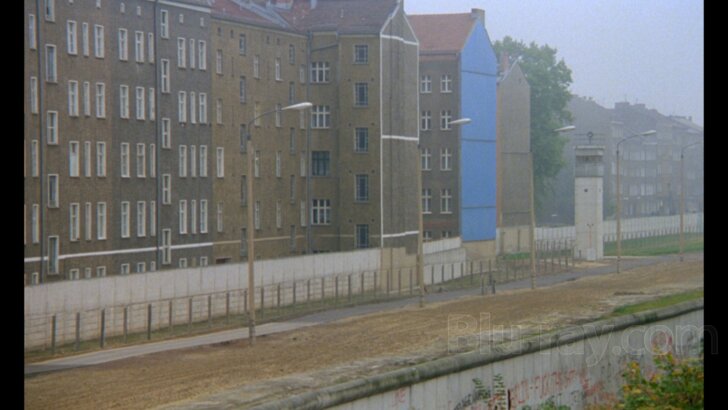
If you are perplexed by Klaus Drittemann's hostility after he moves to West Berlin, you need to understand that during the Cold War the legit dissidents were either thrown in labor camps where they were left to die of 'natural causes' or promptly eliminated by the secret police. There were three kinds of dissidents that successfully made it to the West: high-ranking communists who made secret deals with their comrades in exchange for money or/and sensitive information; the privileged sons and daughters of high-ranking communists who were granted the right to start a new life abroad; and loyal communists who worked as secret informants after they infiltrated the expat communities. This is how the Party controlled its opposition. (In Poland, for instance, this is how the Party actually created its opposition, by placing Lech Wałęsa, an informer, at the very top of Solidarity). Ken Loach's film was supposedly inspired by events from Gerulf Pannach's real-life story, but it becomes overwhelmed by its political insinuations and then quickly loses its focus. It cannot be taken seriously by anyone that actually knows the history of the former Soviet Bloc.
Similar titles
Similar titles you might also like

Heimat: A Chronicle of Germany
Heimat - Eine deutsche Chronik | Standard Edition
1984

Just a Gigolo
1978

The Night Porter
Il portiere di notte
1974

Ladybird Ladybird
1994

The Marriage of Maria Braun
Die Ehe der Maria Braun / Arrow Academy
1978

Phoenix
2014

Bait
2019

Taxi Tehran
تاکسی / Taxi
2015

The Big City
Mahanagar
1963

Our Little Sister
海街diary / Umimachi Diary
2015

Beyond the Hills
După dealuri
2012

Les Cousins
The Cousins / Masters of Cinema
1959

La Notte 4K
The Night | Masters of Cinema | Limited Edition
1961

Things to Come
L'avenir
2016

A Separation
Jodái-e Náder az Simin / جدایی نادر از سیمین
2011

20,000 Days on Earth
2014

The Quiet Girl
An Cailín Ciúin
2022

Tár
2022

Opening Night
The John Cassavetes Collection
1977

The Club
El Club
2015